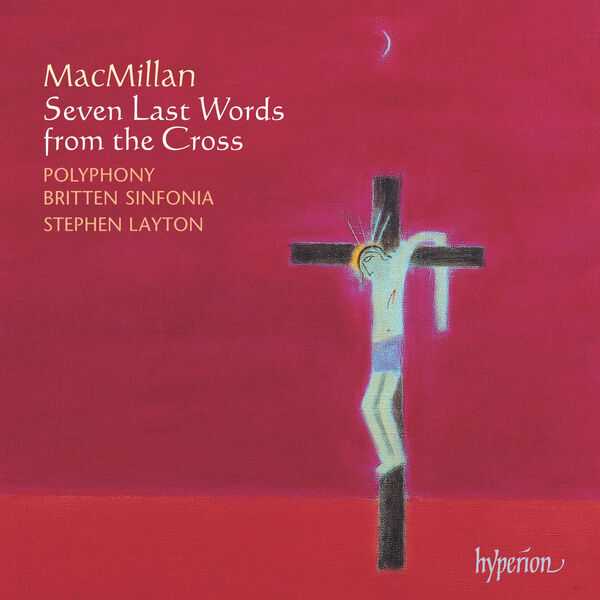
Composer: James MacMillan
Performer: Polyphony
Orchestra: Britten Sinfonia
Conductor: Stephen Layton
Format: FLAC (tracks)
Label: Hyperion
Catalogue: CDA67460
Release: 2005
Size: 254 MB
Recovery: +3%
Scan: yes
Seven Last Words from the Cross
01. I. Father, forgive them, for they know not what they do
02. II. Woman, Behold thy Son! … Behold, thy Mother!
03. III. Verily, I say unto thee, today thou shalt be with me in Paradise
04. IV. Eli, Eli, lama sabachthani?
05. V. I thirst
06. VI. It is finished
07. VII. Father, into thy hands I commend my spirit
08. On The Annunciation Of The Blessed Virgin
09. Te Deum
Hyperions Record of the Month for August by Polyphony and the Britten Sinfonia conducted by Stephen Layton portrays the ultimate dramatic event in historythe Crucifixion of Jesus Christ, expressed through the raw emotional power of one of Scotlands most distinguished and vital composers, James MacMillan. His Seven Last Words from the Cross, first commissioned and screened by the BBC in 1994, depicts the final seven short sentences Jesus uttered, from the mesmerizing opening cadences to the final disturbing hammer-blows of the nails being driven into Christs hands and feet, leaving the listener to wonder at one of the choral masterpieces of our time. Many years ago the same choir recorded this work on the BMG Catalyst labelthe recording was nominated for a Mercury Music Prize. Now ten years later their interpretation has developed and proves that Polyphony has risen to rank amongst the worlds finest professional choirs. Also presented on this disc are two premier recordings by the same composer. On the Annunciation of the Blessed Virgin for five-part choir and organ was written for the choir of Gonville and Caius College Cambridge in 1997 and is set to the stunning poetry about transformation by the seventeenth-century poet Jeremy Taylor; the Te Deum was written in 2001 to celebrate the Queens Golden Jubilee. In both works we have much of the essential MacMillan to savour making this issue indispensable for followers of both MacMillan and Polyphony.
Inspired by his Catholic faith, James MacMillan often composes intense works on religious themes. Yet unlike his older contemporaries, Sir John Tavener and Arvo Pärt, whose calm meditations and ecstatic paeans reflect their composers’ certitude in Christian redemption, MacMillan frequently considers darker subjects and creates a dramatic tension in his music between expressions of suffering and salvation. His setting for choir and string orchestra of the Seven Last Words from the Cross (1993) is the harshest and most disturbing composition on this 2005 Hyperion release, and the severe portrayal of Jesus’ agony is much stronger than the pathos that is usually emphasized in such Good Friday services. Stark polytonality, dissonant counterpoint, dense clusters, and abrasive effects in the strings contribute to the vivid depiction of the Passion; and the choral writing is often tightly chromatic and harmonically unstable, at times in direct conflict with passages of straightforward tonality and open consonance, perhaps to convey MacMillan’s doubts in the midst of belief. Such an ambiguous tone is appropriate for this work, which reaches its nadir in the fourth section, “Eli, Eli, lama sabachthani?” But even in works of praise, such as On the Annunciation of the Blessed Virgin (1997) and the Te Deum (2001), MacMillan communicates his problematic theology through dark sonorities, mysterious dissonances, and haunting, floating counterpoint, and his modern but strangely Gothic vision offers little of what might be understood as consolation or glorification. The polished performances by Polyphony, the Britten Sinfonia, and organist James Vivian, under the direction of Stephen Layton, are effective and moving. Listeners should take care with the volume setting, since this recording has an extremely wide dynamic range.